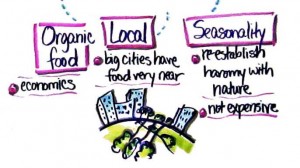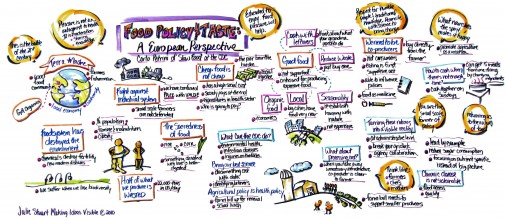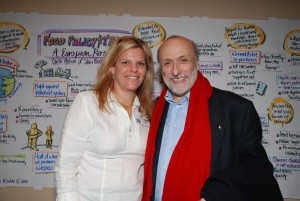 I had the distinct pleasure of visually mapping a presentation that Carlo Petrini, founder of Slow Food, gave to an audience at the CDC the other week on food policy. This was the third such talk in a series that began with Alice Waters then Michael Pollan and now Carlo Petrini. I’ve had the honor of being part of all three.
I had the distinct pleasure of visually mapping a presentation that Carlo Petrini, founder of Slow Food, gave to an audience at the CDC the other week on food policy. This was the third such talk in a series that began with Alice Waters then Michael Pollan and now Carlo Petrini. I’ve had the honor of being part of all three.
I always feel appreciated at the CDC. They love my work and have hired me several times. My original murals are hanging throughout their buildings. They’ve been reproduced into posters and reports. The first mural I did for them, from the Alice Waters talk, spread like wildfire via email. Because of all that I feel right at home when I work there.
It’s fascinating to watch and be a part of the organization’s exploration of fresh ideas around food policy and health with some of the organic food movement’s brightest thinkers and stars.
The battle of the 21st century
Carlo’s talk emphasized the pleasure of food—no surprise coming from an Italian, eh? He talked a lot about growing native foods, spending time with family cooking, eating leftovers—half of the food produced worldwide is wasted. Essentially savoring the unique pleasures that food can provide.
He also talked about how important food policy is in a world where half the population suffers from famine and malnutrition while the other half grapples with obesity. And our industrial agriculture system has degraded the environment and reduced the fertility of the soil at the same time it has introduced new deadly diseases.
Click the image to enlarge 
Some of his key points:
- Cheap food is not cheap. The societal cost shows up in health care expenditures to treat diseases that are a result of bad food—diabetes, heart disease. Chronic disease is not sustainable.
- Food needs to be more seasonal and local. Big cities need to have farms close by or within.
- We need to be co-producers of food, not just consumers. That eating is first a supportive act, we are voting with our fork.
- The sacredness of food. Every culture has revered a certain kind of crop. Think about how important corn is to the Native Americans and their rituals.
- We need respect for humble people and indigenous cultures. There is a lot of knowledge there that can be combined with science to create change.
Taking it directly to the scientists
Talking specifically to the scientists and policy-makers in the audience, he said:
- You are the small scale farmer of policy. The CDC can bring their best science to document the data of food/health costs.
- Agricultural policy is health policy. The upcoming renewal of the Farm Bill is an opportunity to view the country’s food policy through a health lens.
- The Farm Bill needs to support smaller producers so they are on a level playing field.
The quote I loved the most: What nourishes the spirit makes it happy.
Here’s an article from someone who attended Carlo’s talk the day before the CDC talk when he spoke at the Georgia Organics conference—more good friends of mine.
There’s a recipe in there for collard greens, which Carlo got to enjoy while he was here in Georgia and which he loved. All hail the mighty collard!!
(I’m keeping my fingers crossed that they’ll invite me to Terra Madre, the big conference in Italy every other year, where all the lovers of Slow Food gather to exchange ideas and share their knowledge of food culture. Keep a good thought for me, will ya? I’ll hand deliver a few more collards to Carlo. )

